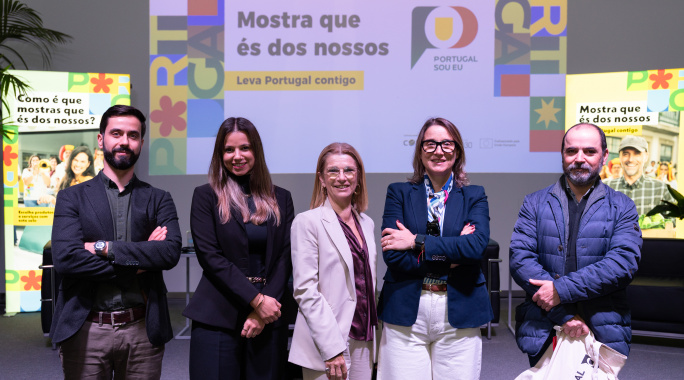News
Sustainability and Circularity Under Discussion During Matosinhos Business Month

The Vasco da Gama Factory hosted the session “Sustainability Design,” part of the Business Month – Matosinhos: Connected for the Future, to discuss the challenges of sustainability, the circular economy, and the valorization of national production.
In her opening remarks, Ângela Crisóstomo, from InvestMatosinhos, emphasized the municipality's commitment to bringing knowledge and businesses closer together, highlighting that “it is essential to reduce the gap between knowledge and ignorance, giving companies the tools to face changes and respond to market challenges.”
The Coordinator of the Portugal Sou Eu Program, Branca Pereira, presented the program's strategic vision, reinforcing the economic impact of national incorporation. She recalled that “the sum of small consumer choices has a huge impact on the economy” and cited the Ernst & Young (EY) study that demonstrates that replacing €10 per month in imports with Portuguese products can add 0.3% to GDP. Taking sustainability as the central axis of the new phase of the program, Branca Pereira highlighted the role of the circular economy and local production in reducing emissions, stating that "by promoting shorter value chains, we reduce the environmental impact and strengthen the national economy." She also presented the new B2B marketplace, designed to facilitate the connection between companies and national suppliers, as well as the brand-based membership model, which is less bureaucratic and more comprehensive.
Sustainability as a competitive factor gained special prominence in the following interventions. Rui Ferreira, from EY, presented the Portugal Sou Eu Digital Network, emphasizing that the circular economy requires collaboration between companies and facilitated access to national suppliers. “Network effects are crucial for increasing national integration and reducing external dependencies,” he stated.
The Digital Product Passport (DPP), one of the European measures with the greatest impact on circularity and traceability, was discussed in detail by Sérgio Ribeiro, Ana Barros (CITEVE), and Diogo Fula (Battery Cluster), who shared experiences in sectors already identified as priorities. The experts highlighted that the DPP will allow tracking the entire product lifecycle—from the origin of raw materials to end-of-life—reinforcing transparency, circularity, and environmental responsibility. They also warned of the urgent need to prepare SMEs for requirements that will become mandatory in the short term.
The event concluded with a presentation by Selma Fernandes, from Agricert, who presented concrete examples of good sustainability practices in the agri-food sector, reinforcing that many of the principles—waste reduction, traceability, energy efficiency—are transversal and applicable to any company.
In her opening remarks, Ângela Crisóstomo, from InvestMatosinhos, emphasized the municipality's commitment to bringing knowledge and businesses closer together, highlighting that “it is essential to reduce the gap between knowledge and ignorance, giving companies the tools to face changes and respond to market challenges.”
The Coordinator of the Portugal Sou Eu Program, Branca Pereira, presented the program's strategic vision, reinforcing the economic impact of national incorporation. She recalled that “the sum of small consumer choices has a huge impact on the economy” and cited the Ernst & Young (EY) study that demonstrates that replacing €10 per month in imports with Portuguese products can add 0.3% to GDP. Taking sustainability as the central axis of the new phase of the program, Branca Pereira highlighted the role of the circular economy and local production in reducing emissions, stating that "by promoting shorter value chains, we reduce the environmental impact and strengthen the national economy." She also presented the new B2B marketplace, designed to facilitate the connection between companies and national suppliers, as well as the brand-based membership model, which is less bureaucratic and more comprehensive.
Sustainability as a competitive factor gained special prominence in the following interventions. Rui Ferreira, from EY, presented the Portugal Sou Eu Digital Network, emphasizing that the circular economy requires collaboration between companies and facilitated access to national suppliers. “Network effects are crucial for increasing national integration and reducing external dependencies,” he stated.
The Digital Product Passport (DPP), one of the European measures with the greatest impact on circularity and traceability, was discussed in detail by Sérgio Ribeiro, Ana Barros (CITEVE), and Diogo Fula (Battery Cluster), who shared experiences in sectors already identified as priorities. The experts highlighted that the DPP will allow tracking the entire product lifecycle—from the origin of raw materials to end-of-life—reinforcing transparency, circularity, and environmental responsibility. They also warned of the urgent need to prepare SMEs for requirements that will become mandatory in the short term.
The event concluded with a presentation by Selma Fernandes, from Agricert, who presented concrete examples of good sustainability practices in the agri-food sector, reinforcing that many of the principles—waste reduction, traceability, energy efficiency—are transversal and applicable to any company.


